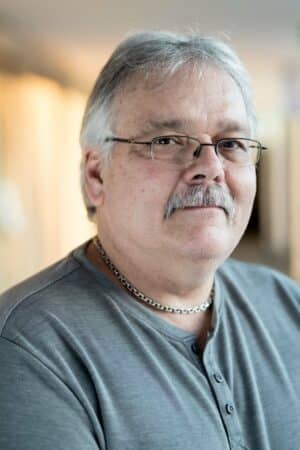BRINGING CARE CLOSER TO HOME
Andy Harris is a Bracebridge resident whose journey with cancer began in 2016.

His diagnosis has been complicated from the start. His care has been coordinated between the David and Catherine Hudson Regional Cancer Centre (HRCC) here at RVH, Princess Margaret Hospital in Toronto and South Muskoka Memorial Hospital in Bracebridge.
Andy was initially diagnosed with cancer of an unknown primary origin (CUP), meaning doctors were unable to determine where in his body the cancer started.
“Because of the CUP diagnosis, PET scans have been recommended,” shared Andy. “Lesser imaging measures failed to provide my specialists with the required information to formulate a complete treatment program.”
A PET scanner, or positron emission technology scanner, is a powerful imaging tool that generates a functional image of the inside of a patient. A small amount of a radioactive glucose substance is injected into the bloodstream. The radioactive tracer adheres to cancer cells, making them highly visible during the scan. The resulting images show doctors where in the body the cancer is hiding.
“I have had three PET scans,” explained Andy. “Each one has been done in Toronto. I live in Bracebridge, so that’s a lot of additional travel, time off work and expense for these tests. Not to mention, cancer treatment takes a lot out of you. Travelling when you’re not feeling the best is difficult.”
Andy was an early advocate for bringing PET technology to RVH. Now that it’s almost here, he sees this as exciting news for HRCC patients.
I’m extremely happy that this technology is coming to RVH. These important tests should be available at the regional cancer centre where we are receiving our care. It’s marvelous to hear that this project is proceeding and that patients like me will have access to this technology in our own region
Andy Harris
“I’m extremely happy that this technology is coming to RVH,” he expressed. “These important tests should be available at the regional cancer centre where we are receiving our care. It’s marvellous to hear that this project is proceeding and that patients like me will have access to this technology in our own region.”
Construction on the space is now underway and the PET CT scanner is expected to be operational by September.
While Andy is currently deemed as having no evidence of cancer, he continues to partake in surveillance CT scans and self-monitoring under the supervision of his medical team at HMRC.

